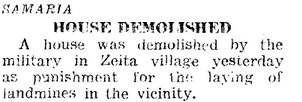
From the Palestine Post, 2nd November, 1938, 2.
Over the past few weeks, Israel reportedly demolished a number of Palestinian homes in East Jerusalem, as well as
Bedouin homes in the Negev.
On 23rd May, the Jerusalem Post reported that government bulldozers had razed
two residential buildings, home to five East Jerusalem families. On 29th May, a number of websites reported that the Beit Hanina home of the al-Salaymeh family was demolished, rendering – according to varying reports – between
10 and
13 people homeless. On 30
thMay, there were reports of demolition in
three Arab Bedouin villages in southern Israel’s Negev desert. The reasons given in all of the above cases were permit and planning related.

Israel has implemented the deplorable policy of housing demolition for decades. The Israeli Committee Against Housing Demolitions estimates that, since 1967, Israel has razed
some 27,000 “Palestinian homes and other structures (livestock pens and fencing for example) crucial for a family’s livelihood” in the West Bank, Gaza and
East Jerusalem.” Aside from
permits and planning – a complex and contentious issue which I will not attempt to expand on here – a smaller percentage of demolitions were carried out for security reasons, and
as a punitive measure to deter Palestinian attacks against Israelis, a policy that was discontinued in 2005.
For those not familiar with Israeli law, it may be interesting to discover that the basis for this latter policy has been British Mandate law. More specifically, Israel cited Article 119 of the 1945 British Mandate Emergency Regulations, enacted by the High Commissioner of the Palestine Mandate, as justification for demolitions. Article 119 states:
“(1) A Military Commander may by order direct the forfeiture to the Government of Palestine of any house, structure, or land from which he has reason to suspect that any firearm has been illegally discharged, or any bomb, grenade or explosive or incendiary article illegally thrown, or of any house, structure or land situated in any area, town, village, quarter or street the inhabitants or some of the inhabitants of which he is satisfied have committed, or attempted to commit, or abetted the commission of, or been accessories after the fact to the commission of, any offense against these Regulations involving violence or intimidation or any Military Court offense; and when any house, structure or land is forfeited as aforesaid, the Military Commander may destroy the house or the structure or anything growing on the land. (2) Members of His Majesty’s forces or of the Police Force, acting under the authority of the Military Commander may seize and occupy, without compensation, any property in any such area, town, village, quarter or street as is referred to in subregulation (1), after eviction without compensation, of the previous occupiers, if any.”*
Even earlier than 1945, however, the British were implementing the policy. Demolition was widely used during the 1936-39 Arab Revolt, when it was carried out under the
Palestine (Defence) Order in Council,
1937. This order authorised the
High Commissionerto enact any regulations “as appear to him in his unfettered discretion to be necessary or expedient for securing public safety, the defence of Palestine, the maintenance of public order and the suppression of mutiny, rebellion, and riot and for maintaining supplies and services essential to the life of the community.” With the 1937 order and the 1945 Emergency Regulation, the British could take action against Arab and Jewish militants in Palestine.
The Mandate Palestine press from that period is replete with reports of demolition by British troops. For example, during the month of November, 1938 the
Palestine Postreported that 29 houses and two “Arab-owned groves” were razed. The demolitions took place between 23
rd October and 13
th November, and were located in villages in today’s West Bank, in Gaza and also in Jaffa.

The Palestine Post, 1st November, 1938, 2.
The reasons given for destroying the buildings included the laying of land mines, houses having served as bases for sniper attacks, and the use of homes as a meeting place for gangs. One case of demolitions was carried out “following the shooting of two soldiers in Gaza.” Another described a raid on a village in which 600 men were detained for interrogation, the village was fined 200 Palestine Pounds, and British troops demolished houses because of “the harbouring of terrorists by the village.” The information was taken from
official British reports.
The local press also reported discussions of the policy back in London. According to a small item on the front page of the Jaffa-based daily Filastin on 16th November, for example, a British member of parliament asked a question in the House of Commons about home demolitions. The newspaper asked: “Is demolition taking place by decree and agreement of ministers?”

From Filastin, 16th November, 1938, 1.
*For a fascinating analysis of how the 1945 law was still cited as legal justification for punitive housing demolitions, see
this 1991 article by Usama R. Halabi, particularly pages 261 to 264.
 Israel has implemented the deplorable policy of housing demolition for decades. The Israeli Committee Against Housing Demolitions estimates that, since 1967, Israel has razed some 27,000 “Palestinian homes and other structures (livestock pens and fencing for example) crucial for a family’s livelihood” in the West Bank, Gaza and East Jerusalem.” Aside from permits and planning – a complex and contentious issue which I will not attempt to expand on here – a smaller percentage of demolitions were carried out for security reasons, and as a punitive measure to deter Palestinian attacks against Israelis, a policy that was discontinued in 2005.
Israel has implemented the deplorable policy of housing demolition for decades. The Israeli Committee Against Housing Demolitions estimates that, since 1967, Israel has razed some 27,000 “Palestinian homes and other structures (livestock pens and fencing for example) crucial for a family’s livelihood” in the West Bank, Gaza and East Jerusalem.” Aside from permits and planning – a complex and contentious issue which I will not attempt to expand on here – a smaller percentage of demolitions were carried out for security reasons, and as a punitive measure to deter Palestinian attacks against Israelis, a policy that was discontinued in 2005.



9 Responses to Israel’s policy of demolishing homes and its roots in the British Mandate